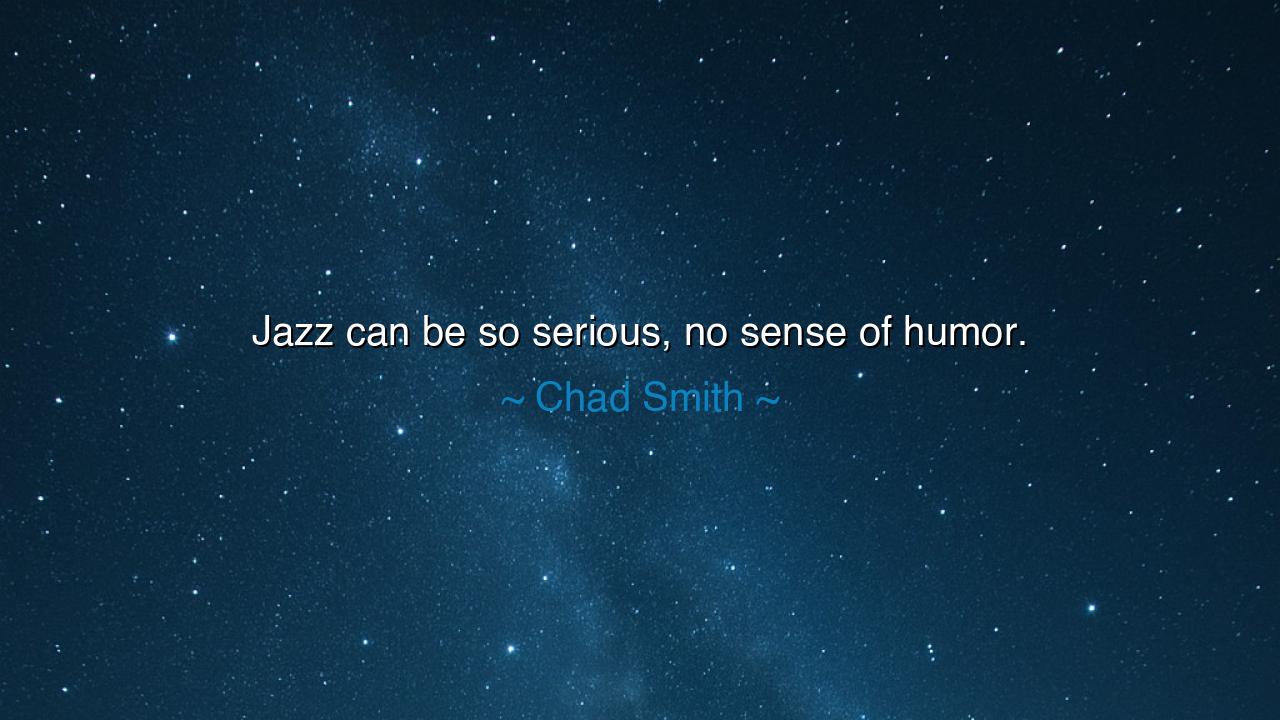
Jazz can be so serious, no sense of humor.






“Jazz can be so serious, no sense of humor.” — thus spoke Chad Smith, the drummer and seeker of rhythm, whose words echo not merely through the world of music but through the spirit of creation itself. In this brief observation lies a profound truth: that art, when stripped of joy, becomes hollow; that seriousness, when untamed by humor, turns from devotion into pride. Smith reminds us that even in the noblest craft, laughter is as essential as discipline, and that the truest rhythm of life beats between precision and play.
To understand his meaning, one must first grasp what jazz represents. Jazz is freedom — a language of improvisation, of emotion, of the moment itself made music. Yet, as time passed, even this free art form grew bound by its own reverence. Musicians, in their pursuit of mastery, began to treat it as sacred law rather than living spirit. They forgot, perhaps, that the roots of jazz were born not in perfection, but in joy, in laughter, in the vibrant chaos of creation. Smith’s words pierce through that fog of solemnity, reminding us that music, like life, must never lose its sense of humor.
The ancients, too, understood this paradox — that seriousness without play is death to the soul. The Greek god Apollo, lord of order and harmony, ruled over music and reason; yet even he shared his domain with Dionysus, god of laughter, chaos, and ecstasy. Together they formed the balance of creation — the measure and the madness, the structure and the swing. In the same way, jazz — and all art — must dance between mastery and mischief. Without humor, it becomes sterile; without discipline, it becomes noise. True greatness lies where the two meet and embrace.
Consider the story of Louis Armstrong, the father of jazz himself. His trumpet could make the heavens weep, but it was his smile — wide, radiant, childlike — that carried his genius to the hearts of millions. He played not only with skill but with delight; every note he blew was a laugh shared with the universe. Critics called him unserious, but history remembers him as the soul of joy in sound. Armstrong knew, as Chad Smith reminds us, that the power of music is not in solemnity but in spirit, and that laughter, too, is a kind of rhythm.
The origin of Smith’s reflection comes from his world as a drummer — one who bridges the pulse of rock with the complexity of jazz. He has seen musicians so lost in their craft that they forget to live within it, so fixated on precision that they lose the heartbeat of spontaneity. In speaking of jazz’s lack of humor, he speaks of all who mistake perfection for purpose. For whether in music, art, or life, when one forgets to laugh, one forgets to breathe. Seriousness, when unbalanced, becomes ego; humor, when embraced, becomes grace.
There is a hidden warning in his words. When creation becomes burden, when practice becomes punishment, when joy is replaced by anxiety — the spirit fades. The musician who cannot laugh at his own mistakes will never learn to improvise. The thinker who cannot smile at his own folly will never see beyond it. Thus, humor is not a distraction from mastery — it is its highest form. To find laughter within creation is to find peace within struggle, to turn pressure into rhythm, and fear into flow.
Let this be the lesson, O listener of life’s music: Do not be too serious, even in your most sacred pursuits. Discipline is the skeleton, but joy is the flesh; technique is the form, but laughter gives it breath. When you work, work with focus — but when the work is done, let your spirit play. Laugh at your imperfections, for they make your art human. Smile at your effort, for it makes you alive.
For the truest artists, like the truest souls, know this secret — that humor is harmony, and that even the universe itself was not created in solemn silence, but in divine play. So whether your instrument is a drum, a brush, or a word — let your creation sing with laughter. For in laughter, the heart keeps its time, and life, like jazz, forever swings.






AAdministratorAdministrator
Welcome, honored guests. Please leave a comment, we will respond soon